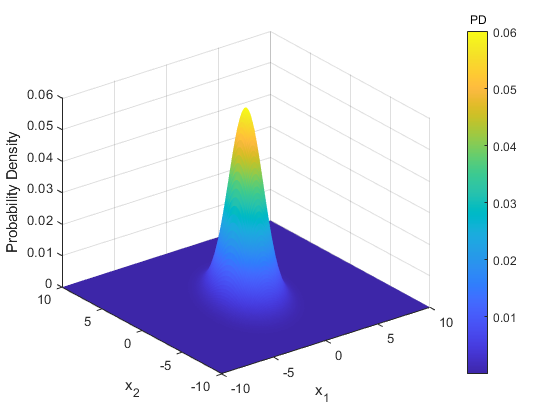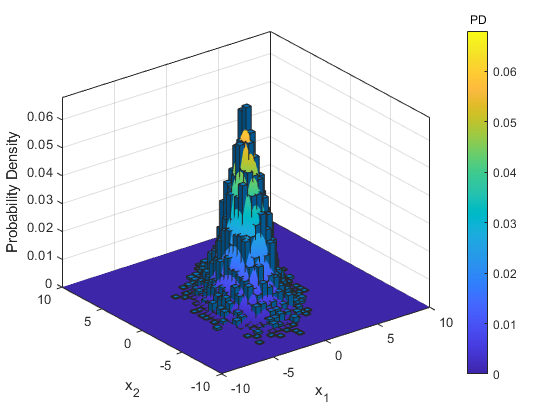mndpdf
This function computes the probability density of a zero-mean
multivariate normal distribution with the given covariance, X, at the
specified values, x.
p = mndpdf(x, X);Inputs
x | Locations at which to evaluate the PDF (m-by-n) |
|---|---|
X | Covariance matrix of the distribution (m-by-m) |
Outputs
p | Probability density at |
|---|---|
err | True to mark the error case that X is indefinite, in which
case the PDF cannot be evaluated; no actual error is thrown;
|
Example
Let's start with the most basic case: a 1-dimensional unit normal
distribution with zero mean. At x = 1, we expect the theory that the
PDF will be about 0.242.
x = 1;
X = 1;
mndpdf(x, X)ans =
0.2420Example: 2-Dimensional Covariance Matrix
Let's try a multivariate distribution:
x = [1; 0]
sigma_1 = 1;
sigma_2 = 2;
X = diag([sigma_1^2, sigma_2^2])
mndpdf(x, X)x =
1
0
X =
1 0
0 4
ans =
0.0483Is that correct? Well, since the two variables are independent (the covariance matrix is diagonal), then the PDF is just the PDF of the first value taken independently times the PDF of the second value taken independently, like so:
mndpdf(x(1), sigma_1^2) * mndpdf(x(2), sigma_2^2)ans =
0.0483Example: Plot and Histogram
Let's look at the PDF of a random 2D covariance matrix.
dx = 0.1;
[x1m, x2m] = meshgrid(-10:dx:10); % Make a point for each dx of x1 and x2.
x = [x1m(:).'; x2m(:).']; % Make vectors.
X = [2 1; 1 4]; % An arbitrary covariance matrix
p = mndpdf(x, X);
pm = reshape(p, size(x1m));
surf(x1m, x2m, pm, 'EdgeColor', 'None')
xlabel('x_1');
ylabel('x_2');
zlabel('Probability Density');
title(colorbar(), 'PD')
Let's draw a bunch of random samples from our covariance matrix and look at the histogram. It should line up nicely.
draws = mnddraw(X, 10000);
histogram2(draws(1,:), draws(2,:), 'Normalization', 'PDF');
hold on;
surf(x1m, x2m, pm, 'EdgeColor', 'None')
hold off;
xlabel('x_1');
ylabel('x_2');
zlabel('Probability Density');
title(colorbar(), 'PD')
If we very roughly "integrate" the PDF over the space, the result should be 1:
sum(mndpdf(x, X) * dx^2)ans =
1.0000Example: Error Conditions
What happens if we use an invalid covariance matrix, where the PDF cannot be evaluated?
[p, err] = mndpdf([1; 2], [0 0; 0 1])p =
0
err =
logical
1It doesn't throw an error, but instead returns 0 with an error flag.
*kf v1.0.3 January 17th, 2025
©2025 An Uncommon Lab
